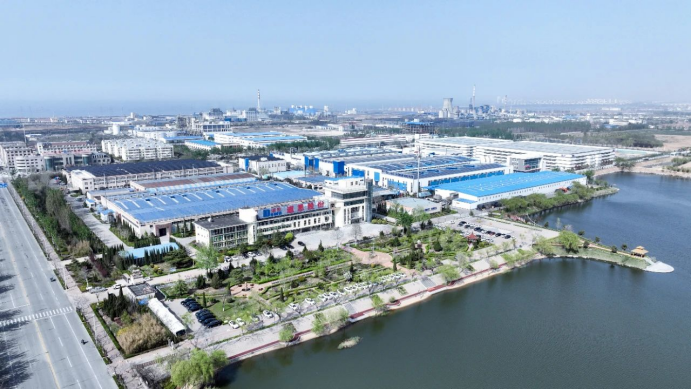On December 16th, the column "Resolutely Promote the High-Quality Development of the Private Economy" on page 2 of Dazhong Daily focused on Dawn Polymer' focus on the research and development, production and sales of recycled materials, and told the story of Dawn's advancement into the recycled plastics track and its achievements in green, low-carbon and high-quality development.

"This is the frame of an air conditioner, and its raw material is recycled polystyrene plastic. Its appearance and performance are almost identical to those of regular plastic, with the main feature being a significant reduction in carbon emissions." On November 29th, in the showroom of Dawn Polymer, R&D Director Wang Hong introduced to reporters.
Plastic is a versatile polymer material made from petroleum and natural gas through a series of complex cracking, separation, and polymerization processes. Wang Hong told reporters that during the production process, every ton of plastic would release 2.3 tons of carbon dioxide. Therefore, plastic recycling and reuse have been important measures for carbon reduction.
A few days ago, Dawn Polymer announced its plan to collaborate with Qingdao Ruibo Ecological Environmental Protection Technology Co., Ltd., a subsidiary of Haier Smart Home, to focus on the research, production, and sales of PCR (Post-Consumer Recycled) plastic recycling materials. Haier has a stable source of waste household appliances for recycling, while Dawn Polymer will restore aging plastics to their original performance through specific processes, achieving sustainable reuse.
"We have conducted a carbon calculation for the entire plastic recycling process. Using our technology, one ton of recycled plastic generates 0.452 tons of carbon emissions across all stages, including raw material procurement, transportation, and product manufacturing," Wang Hong told reporters. "Compared to 2.3 tons, this represents an 80% reduction, showing a significant carbon reduction effect."
After long-term use, the performance of plastic products will deteriorate. This means that recycled plastic often ends up being downgraded, for example, into trash cans or flower pots. Once most plastic products are downgraded and recycled, they are difficult to re-enter the recycling loop, resulting in a waste of resources.
Dawn Polymer’s high-efficiency, low-loss filtration technology, viscosity/molecular weight control technology for recycled products, small molecule low residue technology, and efficient and stable degradation technologies for heat, light, oxygen, and water enable waste plastic to "rest well" and restore its original "strength." At present, there are two process routes for plastic recycling: physical recycling and chemical recycling. Dawn adopts physical recycling, which has lower carbon emissions. In 2021, Dawn also participated in the formulation of five national standards for plastic recycling.
"In the past years, enterprises did not like to use recycled plastic. But in recent years, many well-known enterprises have proactively approached us to use our recycled plastic products," Wang Hong told reporters. In addition to being used in Haier appliances, Dawn also provides recycled plastic products to SAIC Motor Corporation and Geely Automobiles. Furthermore, Dawn's recycled plastic products have obtained PCR certification from BMW, and they have been included in BMW's SLK material list.
Why is recycled plastic so popular?
Enterprises in industries such as automobiles and home appliances not only pursue low-carbon performance during the product's use but also pay close attention to the green and low-carbon aspects of the production process," Wang Hong told reporters. Automotive products exported to markets such as the European Union must provide a full lifecycle "carbon footprint." Using low-carbon, renewable raw materials gives these products a stronger competitive edge in the market.
Driven by policy support and growing demand, the PCR plastic market is expanding rapidly. From ultra-high flow polypropylene meltblown nonwoven fabric materials to specialized elastomeric materials that break foreign technological monopolies, to the new PCR plastic sector, Dawn Polymer has always been at the forefront. At present, Dawn Group is gradually building three major industrial chains: polymer new materials, titanium dioxide, and chemical equipment, and advancing towards its goal of hundreds of enterprises and parks.